|
|
Istanbul 2010 European
Capital Of Culture
|
Sultan Palace Hotel would be happy to plan the
best alternatives for you during your stay in
our historic city. Just tell us a little about
yourself and we will help you to get most from
your Istanbul visit. We would be more than happy
to answer all of your questions and offer you
helpful suggestions to eat, see, and enjoy all
during your stay in our breathtaking city.
Local Eateries, Trendy Night Clubs, Historical
Monuments, Religious and Private tours,
Hospitals, Libraries, or Museums … Istanbul is
just outside our front door….
 |
|
|
Sokullu Mehmet Pasa Mosque |
|
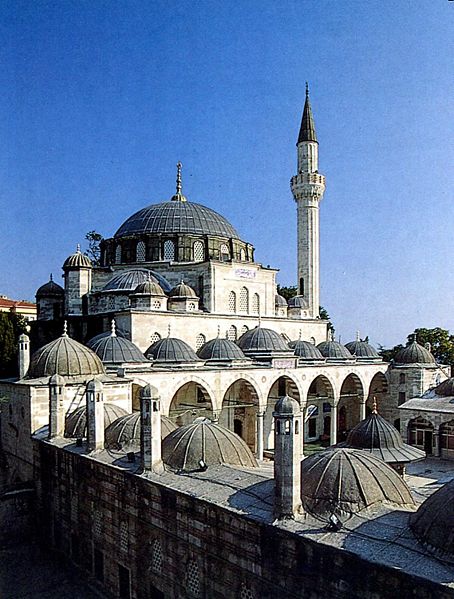 |
The Sokollu Mehmet Pasha Mosque was designed by
Ottoman imperial architect Mimar Sinan for Grand Vizier Sokollu
Mehmet Pasha (husband of one of the granddaughters of Sultan
Suleiman the Magnificent, Princess Esmahan. Its building took
place from 1571 to 1572. The mosque is officially named after
Princess Esmahan, but is more commonly known for its association
with her far more famous husband. |
|
Grand Bazaar |
Distance : 10 min.
|
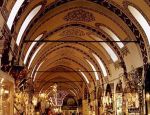 |
During the Byzantine period the area of
the Grand Bazaar was a trade center.
After the Turks came to Istanbul, two bedestens which formed the essence of
today's Grand Bazaar were built between
1455-1461 by Sultan Mehmet the Conqueror
in an attempt to enrich the economic
life in the city. Later on as people
needed more places for their trade, they
also added parts outside these bedestens.
In time the Grand Bazaar was formed. |
|
|
Topkapi Palace |
Distance : 10 min. |
| The former imperial residence from where
the great Ottoman Empire was ruled.
Today a spectacular museum that has one
of the largest collections of Chinese
and Japanese porcelain and very famous
treasury of the Royal Family. |
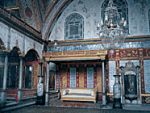 |
|
|
St.
Sophia Museum |
Distance : 10 min. |
 |
The Basilica of St. Sophia, now called
the Ayasofya Museum; is unquestionably
one ot the finest buildings of all time.
Built by Constantine the Great and
reconstructed by Justinian in the 6th
century, its immense dome rises 55
meters above the ground and its diameter
spans 31 meters. You should linger here
to absorb the building's majestic
serenity and to admire the fine
Byzantine mosaics. (Open every day
except Monday.) This huge, brick-colored
building standing at the southern size
of the square was built in the 6th
century.. |
|
|
Blue Mosque |
Distance : 15 min. |
| One of the biggest mosques of Istanbul
from 17th century architecture and is
one of the principal adornments on the
skyline of Istanbul. Also famous for its
blue tiles and 6 minarets. |
 |
|
|
Underground Cistern |
Distance : 15 min. |
 |
Located opposite of Hagia Sophia, it is
the last cistern constructed by
Byzantine Emperor Justinianus the first
in the 6th century.The cistern having
dimensions 70x140m.and with a depth of 8
m.covers 28x12 that is 336 colums
totally,each of them having a Corinth
style capital. |
|
|
Suleymaniye
Mosque |
Distance : 30 min. |
| The mosque of Sultan Suleyman The
Magnificent, was built in the 16 th
century by 'Sinan' the famous architect
of all times. |
 |
|
|
Galata
Tower |
Distance : 25 min. |
 |
This is thought to have been built by
the Emperor Anastasius I ( 491-518 A.D
), although there is probably stronger
evidence to suggest that it may have
been the work of the Gnoese to defend
them against repeated Byzantine attacks.
The Byzantine side of the city was over
the Golden Horn in old Istanbul, between
the Horn and The Marmara sea. |
|
|
Kariye Museum (
St.Saviour in Chora ) |
Distance : 20 min. |
| The monastery church was built outside
of the city walls during the 4th century
by Constantine It remained within the
walls later built by Theodosisus II (
408-450 A.D ) |
 |
|
|
Golden
Horn |
Distance : 20 min. |
 |
The bay with 7 kms. length, has been a
natural harbour of the city. It is as
wide as 800 meters in places, with an
average depth of 35meters. The rivers of
Alibeykoy and Kagithane adjourns into
the Goldenhorn. |
|
|
Spice Bazaar (Egyptian
Bazaar) |
Distance : 10 min. |
| This is the second covered bazaar in
Istanbul. The present structure was
built by Harice Turhan Sultan , dowager
sultan and mother of Mehmet IV or a part
of the foundation of Yeni Mosque.
According to the documents ,the building
was begun by the architect Kasim Aga.
The Present structure was restored in
1943 .The Bazaar has 6 gates and 86
shops. |
 |
|
|
Dolmabahce Palace |
Distance : 50 min. |
 |
The district of Dolmabahce is situated
on the European shores of the Bosphorus
between Besiktas and Kabatas on the
Marmara Sea. Pavilions and royal lodges
were built along the shore from the 15th
century onwards, as the sources inform
us. In time the bay was silted up and
the process of infill began in the reign
of Ahmet I ( 1603-1617 ) |
|
|
The Archeology Museum |
Distance : 15 min. |
| The one of the most important
archeologicial museums in the world. Its
collections posses number of unique
objects from various past civilisations.
There are 50.000 similar items in the
collection of the museum. There are
twenty large halls on the groundfloor
and 16 on the first floor. The lower
galleries displays examples of Greek and
Byzantine architecture and sculpture.
The most famous rooms in the museum are
Salon VIII and salon IX. |
 |
|
|
The Obelisks |
Distance : 15 min. |
 |
Two Obelisk facing one to another are
still to be seen in Sultanahmet square.
Hieroglyphics was brought to Istanbul
from Egypt by the Emporer Theodosius,
and set up its present position in the
Hippodrome. It was given the name column
of Theodosius, and it is 18.45 m in
height, (24.87m. including the base). It
is constructed of Syenite prophry ,
weigthing 200 tons,which is supported on
a marble polinth, measuring 2.75x2.20m. |
|
|
Aquadect of Valens |
Distance : 3 min. |
| The construction was begun by
Constantine I and completed 378 A.D
during the reign of the Emperor Valens.
It links the third and fourth hills and
brought water from Alibeykoy to the
Nympheum. |

|
|
|
|
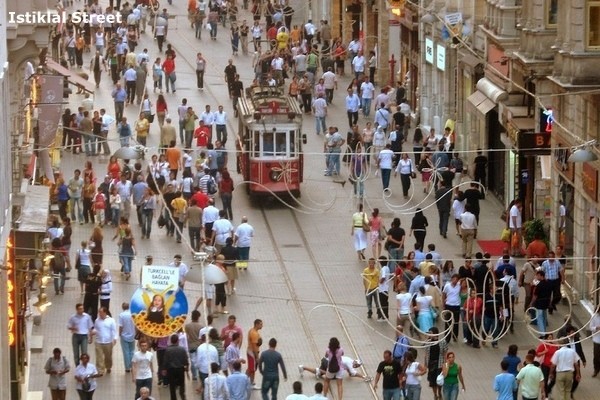 |
Beyoglu near Taksim Square is a part of
the heart of Istanbul, it's a great way
to get way from the old city and enjoy
modern Istanbul as the locals do. There
is so much going on in the approximately
2,5 kilometers long street between the
Tunnel funicular stop near Galata Tower
and Taksim Square that you can spend a
whole day here. You can find a brief of
Istanbul in every corner, there is a
hidden story of the city everywhere.
Religions, languages and ethnic groups
live brotherly around these premises,
it's the center of art and culture, many
national, international and local
activities reach art lovers through the
neighborhood.Beyoglu is a residential
area consisting of 45 districts and
about 225,000 residents, but the daily
population reaches up to a million being
the center of commerce, entertainment
and culture. It's one of the most
important tourist points and one of the
most famous avenues of the city, the
distinguished brands of business and
entertainment world serves in this area
as well. Many exquisite boutiques, music
and bookstores, libraries, art galleries,
cinemas, theaters, cafes, bars,
restaurants, pubs, coffee houses,
patisseries, chocolateries, and
technological centers are lined on
Istiklal Street.Beyoglu has a large
number of foreigners of all
nationalities living in this
neighborhood. The area is also home to
significant Turkish Christian and Jewish
communities, there are several churches
and synagogues. |
|
Princes' Islands |
By ship 2 hours |
The Princes' Islands (Turkish: Prens Adaları [Prince
Islands] or more commonly Kızıl Adalar [Red Islands]
or just Adalar as they are officially named;
classical Greek: Πριγκήπων νήσοι Prinkēpōn nēsoi,
modern Greek: τα Πριγκηπόνησα ta Prinkiponisa or
Πριγκηπονήσια Prinkiponisia), are a chain of nine
islands off the coast of Istanbul, Turkey, in the
Sea of Marmara.
They consist of four larger islands, Büyükada (meaning
"Large Island"; Greek: Πρίγκηπο(ς), Prinkipo(s),
from πρίγκιπας meaning "prince") with an area of
5.46 km2 (2.11 sq mi), Heybeliada (meaning "Saddlebag
Island"; Greek: Χάλκη Halki) with an area of 2.4 km2
(0.93 sq mi), Burgazada (Greek: Αντιγόνη Antigoni,
the name of a mythological figure) with an area of
1.5 km2 (0.58 sq mi), Kınalıada (meaning "Henna
Island"; Greek: Πρώτη Proti, meaning "First", being
the closest island to Istanbul) with an area of 1.3
km2 (0.50 sq mi), and five much smaller ones, Sedef
Adası (meaning "Mother-of-Pearl Island"; classical
Greek Τερέβινθος Terebinthos and modern Greek:
Αντιρόβυθος Antirovithos) with an area of 0.157 km2
(0.061 sq mi), Yassıada (meaning "Flat Island";
Greek: Πλάτη Plati) with an area of 0.05 km2 (0.019
sq mi), Sivriada (meaning "Sharp Island"; Greek:
Οξειά Oxeia meaning the same) with an area of 0.05
km2 (0.019 sq mi), Kaşık Island (Turkish: Kaşık
Adası, "Spoon Island", named for its shape; Greek
Πίτα Pita) with an area of 0.006 km2 (0.0023 sq mi),
and Tavşanadası (meaning "Rabbit Island"; Greek
Νέανδρος Neandros, the name of a mythological figure)
with an area of 0.004 km2 (0.0015 sq mi). The
islands also constitute the Adalar District ("Island
district") of Istanbul Province.
The mayor is Mustafa Farsakoğlu |
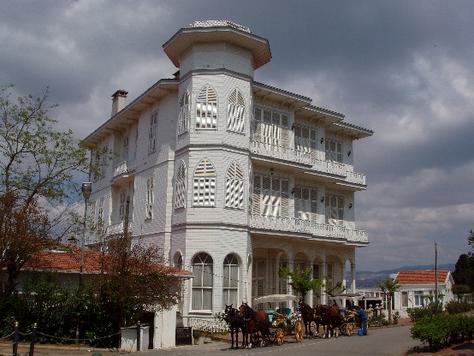 |
|
KADIKÖY |
Distance :
1 Hour. |
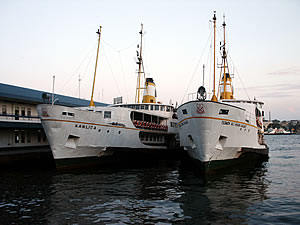 |
Further down to the south along, the Istanbul strait
towards the Marmara sea, Kadiköy has developed into
a lively area with up-market shopping, eating and
entertainment making it popular especially with
wealthy locals. Once prominent in the history of
Christianity, the 5th century hosted important
consul meetings here, but there are few reminders of
that age. It is one of the improved districts of
Istanbul over the last century, and fashionable area
to promenade along the waterfront in the evenings,
especially around the marinas and yacht clubs.
Bagdat Caddesi is one of the most trendy - and label-conscious
- fashion shopping streets, and for more down-to-earth
goods, the Gen Azim Gündüz Caddesi is the best place
for clothes, and the bit pazari on Ozelellik Sokak
is good for browsing through junk. The Benadam art
gallery remains in Moda district with many other
foreing cusines, restaurants and cafes.
Haydarpasa: To the north of Kadikoy is Haydarpasa,
and the train station built in 1908 with Prussian-style
architecture which was the first stop along the
Baghdad railway. Now it is the main station going to
eastbound destinations both within Turkey, and
international. There are tombs and monuments
dedicated to the English and French soldiers who
lost their lives during the Crimean War (1854-56),
near the military hospital. The north-west wing of
the 19th Century Selimiye Barracks once housed the
hospital, used by Florence Nightingale to care for
soldiers, and remains to honour her memory. |
|
| |
|
|
|
|







